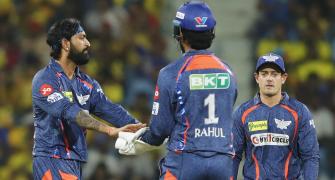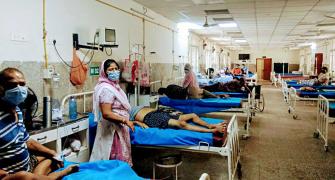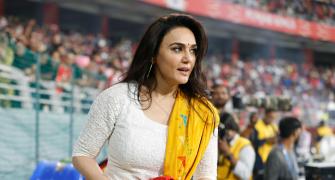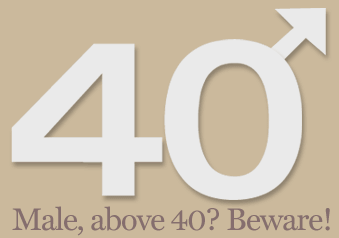
If you are a male and above 40, try to answer these questions.
- Do you suffer from decreased energy levels?
- Do you tire fast?
- Are you more irritable than ever?
- Do you suffer from mood swings?
- Do you find it difficult to concentrate on your job?
- Do you feel distressed?
- Do you feel your memory has become bad?
- Do you feel your muscle strength going down?
- Have you suffered from a fracture?
- Has your desire for sex reduced?
- Do you have erectile problems?
If the answer to at least some of these questions is yes, you could be suffering from andropause, or male menopause, the paucity or decline in the male hormone androgen, also known as testosterone.
Andropause is equivalent to the menopause that women over 45 suffer from. The difference is that menopause starts with the complete stoppage of menstrual periods and the production of the hormone oestrogen. But in men, the production of androgen reduces gradually, but never stops altogether.
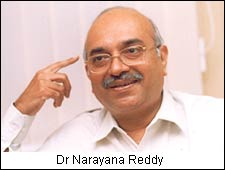 A market research group, of which Dr Narayana Reddy, sexologist and president of the Indian Andropause Society, was a part, conducted a survey in the four metros of India and found that the 'slowdown' symptoms start at age 35 in Delhi, 41 in Mumbai, and 45 in Chennai and Kolkata. In European countries and the United States, andropause generally starts at 40.
A market research group, of which Dr Narayana Reddy, sexologist and president of the Indian Andropause Society, was a part, conducted a survey in the four metros of India and found that the 'slowdown' symptoms start at age 35 in Delhi, 41 in Mumbai, and 45 in Chennai and Kolkata. In European countries and the United States, andropause generally starts at 40.
The study found that nearly 80 per cent of men do not seek any medical advice. While 38 per cent undertake self-treatment for these symptoms and 42 per cent see them as part of ageing, the rest seek advice from doctors of various specialities like urologists, psychiatrists, sexologists, endocrinologists, consulting physicians, and family physicians.
"The variation in the four metros, I think, would probably be due to the stress and strain men experience at their workplaces," Dr Reddy said. "The pressure may be more in Delhi and Mumbai than in Chennai and Kolkata."
According to the doctor, stress and strain play an important role in the rate at which the production of the hormone androgen declines in the male. "Stress is not good for health, so when general health is affected, hormone production is also affected," he explained. "The more the stress, the faster the rate of decline."
At age 40, most men are at the pinnacle of their careers, and a decline in the hormonal level has a negative influence on their careers as well as personal life. "That is why we are trying to create awareness about andropause," he said. "Unlike earlier years, man reaches his peak level especially in the professional field around 40. If his physical fitness comes down, it affects his career badly. This is not just a doctor's concern or a medical problem. It is a socio-medical problem because society is going to be affected."
Ramamurthy (name changed), 54, managing director in a reputed firm, was forced by his wife to visit Dr Reddy's clinic. Her accusation was that her husband was having an affair with his secretary, and she asked Dr Reddy to counsel him. When asked what made her think he was going astray, she said, "He used to have sex almost everyday, but for the past year and a half, he has not come anywhere near me." That made her think he was having fun elsewhere.
A desperate Ramamurthy told Dr Reddy, "Leave alone sex, I am not able to manage my professional life also properly. The demands of my work after I became MD are draining me out. I get tired very fast, and the moment I reach home, I want to lie down and sleep. Where's the time to think of sex?"
Dr Reddy smelt andropause and asked his reluctant patient to go for a hormonal test. The test proved that his hormonal level was on the decline. After a few months of treatment, the visibly happy couple returned to Dr Reddy's clinic and the wife apologised profusely to Ramamurthy in front of the doctor for suspecting his fidelity!
"He thanked me and said that his energy levels had gone up," Dr Reddy said. "He was happy not only in his personal life but professionally too."
It was in 1939 that a Dr Werner in the United States first reported the symptoms of this condition and called it Male Climacteric Syndrome, as he linked the symptoms with the decline in the hormone, but people scoffed at him. Later, the name viropause was coined. Then came testodwindle. It was also jokingly called 'penopause'.
But it was in 1994 at the first Austrian Congress of Andrology in Vienna that the term 'Padam' was coined, which is an acronym for 'partial androgen deficiency in the ageing male'. Finally, in the year 2000, the World Health Organisation decided to name the syndrome andropause.
"I would recommend the name andropause as it is simple and non-technical," Dr Reddy said. "The technical word for this is 'late onset hypogonadism'. As the word menopause is quite commonly used now, andropause is also easily understood."
Dr Reddy said men in India are only slowly becoming aware of the symptoms and connecting them to andropause. "From my experience, I have found that men are ready to come forward for treatment, but the scientific fraternity is slow to accept the change."
As the symptoms are caused by a hormonal deficiency, it is essential that medicines be taken internally. This is commonly called 'hormone replacement therapy'.
There are about 100 million men in the age group of 45-65 in India. By the year 2025, 50 per cent of the world's 65 plus population will be living in India and China, according to global projections. This is precisely why Apollo Hospitals, Chennai, has been encouraged to open India's first andropause clinic.
"Western countries became developed before they became old," Dr Prathap C Reddy, chairman of the Apollo Hospitals Group, explained. "But in this region the countries while developing are getting old. Therefore, we stand before an 'agequake'. One needs to start catering to an age group that was non-existent 20 years ago. Preventing the preventable and delaying the inevitable will decrease the economic burden of society. Symptoms of ageing can be delayed by educating people to improve their lifestyles and using preventive medical care in treating symptoms soon."
According to Dr Narayana Reddy, who is a consultant on sexual medicine at Apollo Hospitals, the andropause clinic/registry aims to record data about andropausal men and alleviate their sufferings so that they can lead a good quality life, contribute to the nation's economy, and fulfil their social commitments.
"We want to take Indian men out of the compromise and self-denial stage, through education and awareness," he said. "Improving the overall quality of life for 40 plus Indian males is our core objective."
The life expectancy of an Indian male in 1950 was just 40 years. Today, it is 63 years and by 2025 it is expected to go up to 84 years. "We are not just interested in prolonging life," Dr Narayana Reddy said. "We are interested in improving the quality of life so that he will be useful to his family, society, and nation as a whole."
Headline Image: Uttam Ghosh | Photograph: Sreeram Selvaraj


